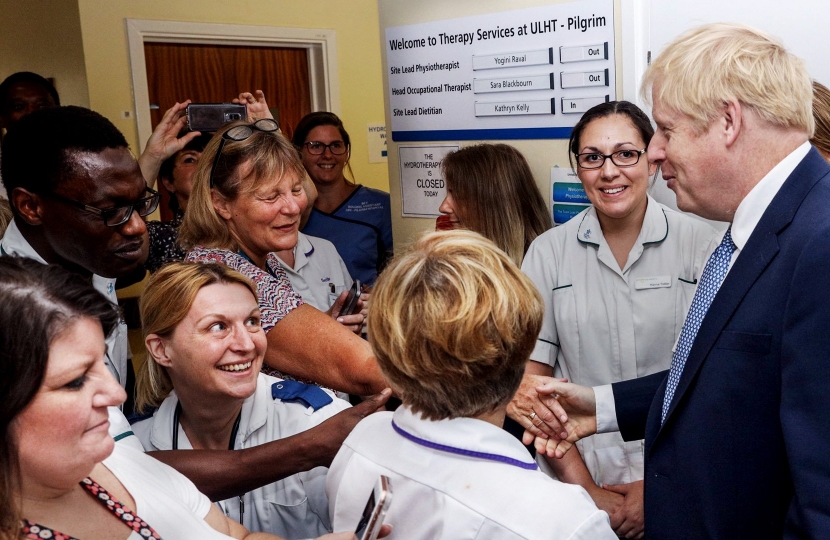
As part the Conservatives’ healthcare policy commitment to strengthening our NHS, Prime Minister Boris Johnson has announced a £1.8 billion cash injection to ensure that frontline services have the funding that they need. This will make a real difference to the lives of doctors, nurses, and above all, patients.
Read on below to find out more about how we're protecting our NHS.
Which hospitals are getting extra funding?
The money will go to 20 hospitals up and down England, from the Isle of Wight and Cornwall to Newcastle and Leeds.
Many hospitals in major towns and cities are getting funding, including in Luton, London Birmingham, and Manchester.
We are providing extra funding to more rural hospitals too, including the Wye Valley NHS Trust, the South Yorkshire and Bassetlaw Integrated Care System, and hospitals across Norfolk and Suffolk.
The devolved administrations will receive additional Barnett funding, as we are committed to delivering for the whole of the United Kingdom. In total, hundreds of millions more will be given to each administration to help NHS trusts in each region.
The Conservatives’ NHS policy will ensure frontline services have what they need.

Boris Johnson said “The NHS is always there for us – free at the point of use for everyone in the country. With our doctors and nurses working tirelessly day in day out, this treasured institution truly showcases the very best of Britain”.
That’s why, as part of the Conservatives’ NHS policy, we’re providing £1.8 billion more to hospitals in England on top of the £33.9 billion in cash we have already promised to invest in the NHS.
This money will flow into the NHS quickly as well - we promise that £1 billion of the £1.8 billion will be spent this year. This means we’re providing an annual increase in the NHS’s capital budget of 30 per cent for 2019.
We have this extra money to spend on the NHS thanks to the strong performance of the UK economy in 2019. By delivering a strong economy, we have the money to invest in our vital NHS services.
We are providing more money for the NHS than Labour’s policy would.
The Conservatives have always been the party of the NHS. We been running the NHS for more than half of its history – 44 of the last 71 years.
Labour’s NHS plans don’t match ours. They’re actually offering less money for the NHS than we are. In their manifesto, Labour committed 2.2% more a year during this Parliament, which they said would ‘restore the NHS to be the envy of the world’. Our new budget settlement provides substantially more, at 3.4% a year. And our latest cash injection of £1.8 billion means we’re going even further.
And while we’re providing to hospitals, aiming to directly help patients, Labour’s healthcare policy has a history of not helping those who need it. When Labour were in government, barely half of their healthcare spending went to helping patients – instead, it was absorbed by higher pay and prices.
We have been spending more money each and every year to protect our health service. While we made difficult decisions to cut the deficit and rein in Labour’s out-of-control spending, we protected and prioritised the NHS with increases in spending every year.
Only the Conservatives can be trusted to protect the NHS and put patients first. Labour’s NHS policies risk our hard work being undone.
The hospitals getting funding are:
East of England
- Luton & Dunstable University Hospital NHS FT – £99.5 million for a new block in Luton to provide critical and intensive care, as well as a delivery suite and operating theatres.
- Norfolk & Norwich University Hospitals NHS FT – £69.7 million to provide Diagnostic and Assessment Centres in Norwich, Great Yarmouth and Kings Lynn to aid rapid diagnosis and assessment of cancer and non-cancerous disease.
- Norfolk and Suffolk NHS FT – £40 million to build four new hospital wards in Norwich, providing 80 beds.
- NHS South Norfolk CCG – £25.2 million to develop and improve primary care services in South Norfolk.
Midlands
- University Hospitals Birmingham – £97.1 million to provide a new purpose-built hospital facility in Birmingham, replacing outdated outpatient, treatment and diagnostic accommodation.
- United Lincolnshire Hospitals Trust – £21.3 million to improve patient flow in Boston by developing urgent and emergency care zones in A&E.
- Wye Valley NHS Trust – £23.6 million to provide new hospital wards in Hereford, providing 72 beds.
- University Hospitals of North Midlands NHS Trust – £17.6 million to create 3 new modern wards to improve capacity and patient flow in Stoke, delivering approximately 84 beds for this winter.
London
- Barking, Havering and Redbridge CCGs and North East London NHS Foundation Trust – £17 million to develop a new health and wellbeing hub in North East London.
- Croydon Health Services NHS Trust – £12.7 million to extend and refurbish critical care units at the Croydon University Hospital, Croydon.
North East and Yorkshire
- South Yorkshire and Bassetlaw Integrated Care System – £57.5 million for primary Care investment across South Yorkshire and Bassetlaw.
- The Newcastle upon Tyne Hospitals NHS Foundation Trust – £41.7 million to improve Paediatric Cardiac Services in the North East.
- Leeds Teaching Hospitals NHS Trust – £12 million to provide a single Laboratory Information Management System across West Yorkshire and Harrogate, covering all pathology disciplines.
North West
- Greater Manchester Mental Health NHS Foundation Trust – £72.3 million to build a new adult mental health inpatient unit in Manchester.
- Mersey Care NHS Foundation Trust – £33 million to provide a new 40 bed low secure unit for people with learning disabilities.
- Stockport NHS FT – £30.6 million to provide a new Emergency Care Campus Development at Stepping Hill Hospital in Stockport, incorporating an Urgent Treatment Centre, GP assessment unit and Planned Investigation Unit.
- NHS Wirral CCG – £18 million to improve patient flow in Wirral by improving access via the Urgent Treatment Centre.
- Tameside and Glossop Integrated Care NHS Foundation Trust – £16.3 million to provide Emergency and urgent care facilities at Tameside General Hospital in Ashton-under-Lyne.


